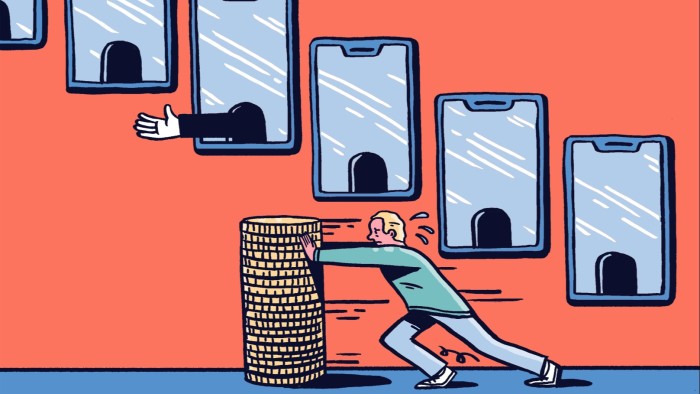Unlock the Editor’s Digest for free
Roula Khalaf, Editor of the FT, selects her favourite stories in this weekly newsletter.
Mad for it, I am. I just bought my ticket for the big Oasis reunion at Wembley in July. It cost me £1,537 on resale site Viagogo.
My seat will be way up behind the stage, so I won’t have a great view. But at least I can look down on paupers who only paid around £400 for the last tickets in the standing area.
Another piece of good news: there is no evidence Ticketmaster used an algorithm to stiff fans when it first put tickets on sale last autumn. That is what the Competition and Markets Authority said in findings last month.
Instead, the ticketing business just charged indignant concert goers an arm and a leg the old-fashioned way, the watchdog reckons. Ticketmaster swiftly sold out of lower-price standing tickets at around £135 each. After that, it charged concert goers, who had been queueing lengthily, up to 2.5 times more without a decent explanation.
OK, to be truthful, though the ticket prices were real enough when I looked them up, I’m not going to see Oasis. They are a great band. And you cannot blame monobrowed Mancs for the adoption of “Wonderwall” as the party piece of a generation of intense young men with acoustic guitars. But these days I prefer a bookshop, a pub lunch and a nap to a rock ’n’ roll gig.
I was, however, intrigued by the idea — acknowledged by the CMA — that consumers are particularly indignant about overcharging, when an algorithm is responsible. It reflects a justifiable fear that everything we do is now subject to scrutiny and price gouging by the electronic servants of Mammon.
Programs that tweak prices to reflect demand have been around for decades, notably in the airline industry. In recent years, they have infiltrated other sectors, such as taxis, hotels, consumer goods and theme parks.
Merlin Entertainments, the big visitor attractions business, caused a stir a year ago when it announced it was introducing “dynamic pricing”. It was the last straw for some parents whose holiday cheer was already being tested by the prospect of a long, hot trip to Legoland Windsor with a carload of sprogs tripping on Haribo.
You can interpret “dynamic pricing” however you want. Businesses that deploy the technology argue it is different to “surge pricing” — the distinction being that supposedly the former imposes limits on prices.
Or perhaps it is just that “surge pricing” smacks of a budget airline offering passengers the opportunity to upgrade to Premium VIP (complimentary parachute included) moments after the aircraft has burst into flames.
This is certainly how it can feel when the price of an Uber ride spikes amid rainstorms and train cancellations.
A squint at Legoland’s bookings webpage suggests dynamic pricing has had a less-than-revolutionary effect on its own prices. The website quoted a peak Easter holiday price of £43 per person compared with £29 after school term started. For a family of four, that is £56 extra. But vacation season surcharges have always applied in the travel industry.
Premier Inn is a louder, prouder exponent of dynamic pricing. Punters wishing to stay at the hotel closest to Ascot racecourse on the night before the Gold Cup in June were shelling out £272 for a standard room, when I checked. The price dropped to £93 the following Monday.
Legoland savvily categorises its advance, online prices as discounted alternatives to its walk-up prices, in this case £68 per person. I suspect only the most harassed and forgetful of visitors pay on a walk-up basis, presumably blinking back tears as they do so.
It is, meanwhile, a truism of behavioural finance, the subject of these columns, that customers welcome discounts almost as much as they hate surcharges.
In a report last autumn, Consumer Scotland came to the blindingly obvious conclusion that people like dynamic pricing when it gives them an apparent bargain, but hate it when they end up paying top dollar.
Businesses such as Premier Inn and Merlin therefore factor price ceilings into their algorithms. Legoland Windsor prefers to sell out of tickets for Easter Sunday rather than dispose of the last one for £400 and stand accused of surge pricing.
Florian Stahl, professor of marketing at Mannheim University, says a business that imposes no price ceiling is opting “to transact with customers, rather than have a relationship with them”.
This certainly seemed to be the ethos of Uber co-founder Travis Kalanick. Ultra-libertarian philosopher Ayn Rand, who saw transactions as preferable to relationships, is popular among tech bros of a cerebral kind.
But as Professor Stahl points out, some consumers are shocked to discover that running shoes available for $90 on Amazon in the morning may cost $100 if they postpone the purchase until the afternoon.
Most of us appreciate that prices for goods and services are set by supply and demand. What damages our trust in companies is the suspicion that they may have overcharged us relative to that strict correspondence — or that we bought at nosebleed levels.
Dynamic pricing is becoming ever more prevalent and sophisticated. That leaves businesses with tricky choices to make. Brand-conscious companies will set intelligent ceiling prices and outline policies publicly. Transactional rivals will let the market rip and leave us struggling to navigate it.
It transpires that a computer was not to blame for a champagne supernova in Oasis ticket prices. The jeopardy for business is underlined by the resentful assumption that it was.
Jonathan Guthrie is a writer, an adviser and a former head of Lex; [email protected]
